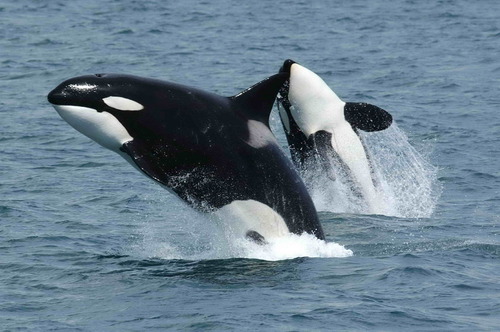
Killer Whale
Orcinus orca, the majestic killer whale, graces oceans globally with its iconic black and white pattern. As apex predators, they demonstrate remarkable intelligence and intricate social bonds, making them masters of the sea. Orcas play a crucial role in marine ecosystems, showcasing nature's balance and beauty.
30-50 years
Lifespan
2721.55 - 6803.89 kg
Weight
Black, White
Color
30 mph
Top Speed
Data Deficient
Conservation Status
Unknown
Population Trend
Characteristics
Orcinus orca, commonly known as the orca or killer whale, is a highly social and intelligent marine mammal. They are apex predators, found in oceans worldwide, from polar regions to tropical seas. Orcas are recognized for their striking black and white coloration, diverse vocalizations, and complex social structures.
Distribution Range of the Killer Whale
Orcinus orca, commonly known as the killer whale or orca, is found in all of the world's oceans, from the Arctic and Antarctic regions to tropical seas. They are most commonly seen in higher latitudes and are known to inhabit regions such as the North Atlantic Ocean, the North Pacific Ocean, and the Southern Ocean around Antarctica. Significant populations are found off the coasts of Norway, Iceland, the North American Pacific Northwest, and around New Zealand.
Killer Whale's Habitat
Environmental Conditions
Orcas inhabit a wide range of environmental conditions. They are found in both coastal and offshore waters, preferring cooler waters in higher latitudes but are also present in warmer equatorial regions. They can be found in a variety of marine environments, including open oceans, seas, and even estuaries and shallow bays. The water temperature, salinity, and depth can vary widely across their range.
Ecological Niche
Orcas are apex predators, meaning they are at the top of the food chain. Their diet is diverse and varies depending on the region and available prey. They are known to feed on fish, squid, and marine mammals such as seals, dolphins, and even whales. This diversity in diet reflects their adaptability to different ecological niches, ranging from fish-eating residents to mammal-hunting transients. The ecological role of orcas is significant as they influence the population dynamics of their prey and maintain the balance of marine ecosystems.
Copyright @ Nature Style Limited. All Rights Reserved.
 English
English